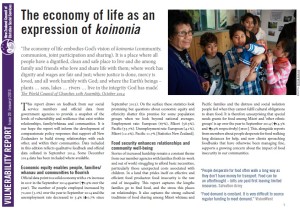Vulnerability Report 20 – January 2015
While the official statistics paint a picture of a solid economy – good economic growth and more jobs, looking deeper shows how unequally the benefits of growth are being shared. The unemployment rate has not declined significantly with the unemployment rate for Māori (12.2%)and Pasific (11.7%) still around three times the European rate (4.1%).
Housing and food hardship is combined with more people in working households needing to seek out assistance from social services. NZCCSS Executive Officer Trevor McGlinchey, summing up the latest report commented, “while the numbers of people on benefits drop and the number of hardship and other special grants made by Work and Income decreases, the demand for food parcels, budget advice, family counselling and other supports from of Christian social services members continues to grow.”
Food insecurity
“Food demand is constant. It is very difficult to source regular funding to meet demand.” VisionWest
In a land that prides itself on effective and efficient food production food insecurity is the raw end of inequality. The report captures the lengths families go to find food, and the stress this places on relationships. For example, the number of special needs grants for food increased by 14.5% among Māori and by 9.9% for ‘other ethnic groups’ over the year to September 2014. NZCCSS member agencies told us about people desperate for food walking long distances for help and new clients approaching foodbanks who have otherwise been managing fine.
Housing Shortages – Women & Children most impacted
“Unless we have a major increase in the number of houses available there is no answer. Overcrowding of two or more families is common practice. Demand for assistance with housing has increased dramatically. Evictions taking place without regard to cultural norms (e.g. taking in other families on need) and then no suitable housing to move into. Families are being forced to live in unsuitable transient boarding houses.” Salvation Army
Housing availability and affordability across the housing sector (emergency, private and state and social housing) remain strong concerns to our member agencies. Members report a dearth of emergency housing in general, and for women and children in particular, and the limited and unsafe options vulnerable women have when urgent housing solutions are needed. Sleeping in caravans, garages, cars and boarding houses are the ‘constrained choice’ of many families in New Zealand today.
While rents are up across all major centres (e.g. Christchurch 5.7%, Auckland 4%, & Wellington 2%) and increasing faster than incomes, there has been a small 1.6% decline in the accommodation supplement over the year to September 2014. It is not clear why official demand for this benefit is down when the need for assistance with housing as reported by our members is so high.
People renting in the private rental market face greatest insecurity. We heard stories about pregnancy, serious illness and the death of a spouse inviting no compassion among some private landlords. For some families subsidised state housing is the best solution to unaffordable private rents. However, the waiting list is huge with 5,599 listed on the state housing register. Member agencies report a sense of hopelessness among a group of people for whom renting in the private sector is genuinely ‘out of their league’, leaving them with few dignified, clean and safe housing options.
Young People Still Slipping through the gaps
Not in Employment, Education or Training (NEET) figures for 15 – 24 year-olds shows a decline of 3,500, it is still Māori (20.2%) and Pasifika (18.2%) young people who much more affected than European (9.6%). Over recent years there has been some significant commitment by government to improve this situation, including the introduction of Youth Services to provide wrap-around support to teen parents and beneficiaries to engage in education, training and ultimately employment. Despite all of this commitment, members still report that some youth continue to slip through the cracks and receive no support or income. More work is needed to understand why this is occurring and how these young people are surviving and the stories from young parents who attended parenting programmes at Te Waipuna Puawai give some insights about what kind of support works best for them.
As the number of people on benefits trends down, we hear about parents juggling work and childcare responsibilities, particularly those with special needs children, and children with behavioural challenges. Childcare centres have been hailed as the solution for these working mothers. For some parents, developing positive parenting skills and life skills is far more likely to have long-lasting benefits to both child and family than focusing solely on mothers returning to work.
Getting Help Early – Preventative Services
“People are not going to doctors as this is not seen as a priority when they have to pay for rent and food.” City Mission
Children and families/whanau do not suddenly become vulnerable and at-risk overnight – there is generally an escalation of vulnerability and risk over many years. Preventative and universal health services are vital to help get in early yet there are signs these kinds of services are under pressure as government seeks to channel funding to the high-needs vulnerable children in the roll-out of Children’s Teams.
The interface between Work & Income and the health system is still challenging for some with doctors visits unaffordable for families and others face in understanding and fulfilling Work and Income obligations for medical certificates.
Read the full report on our website:[wpfilebase tag=file id=1279 /]

